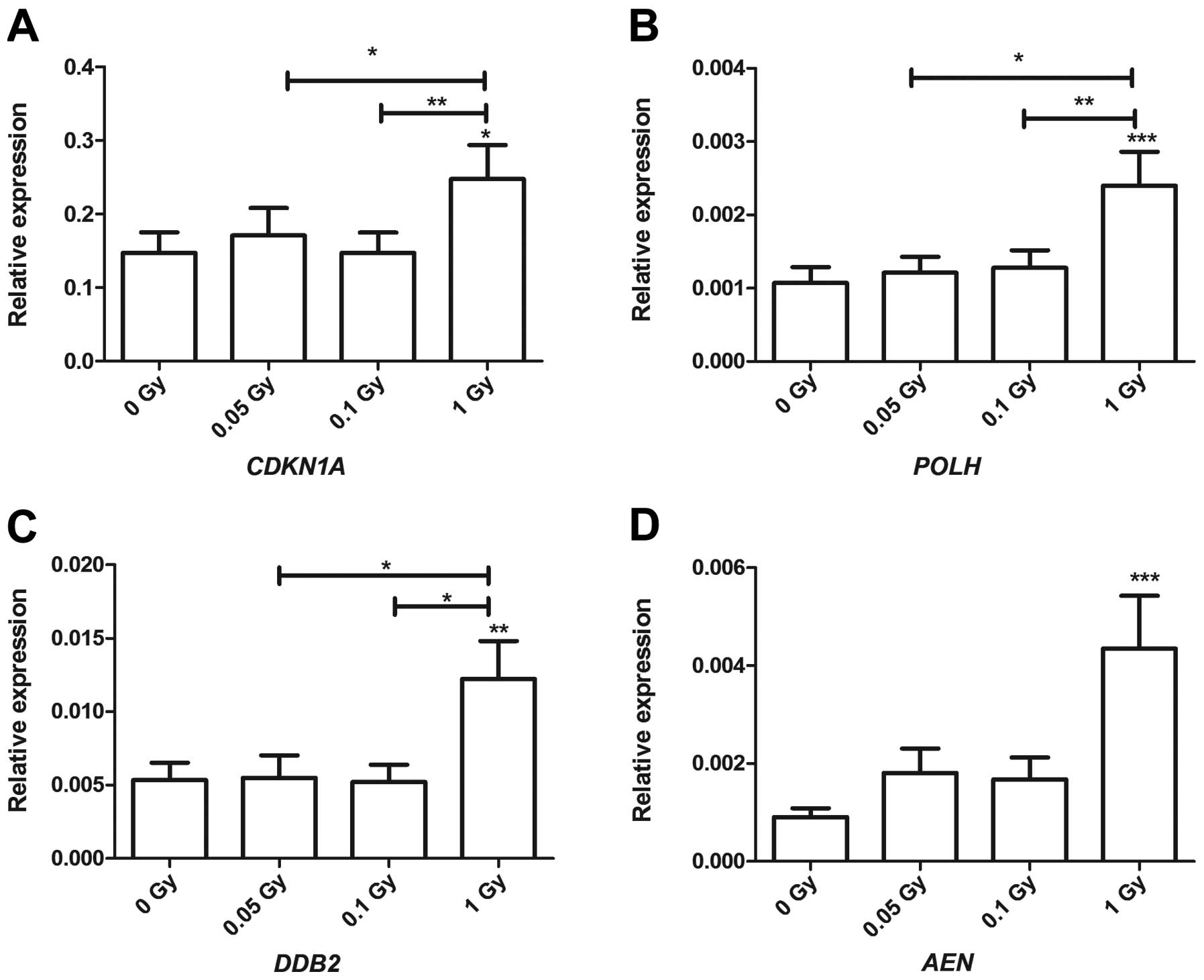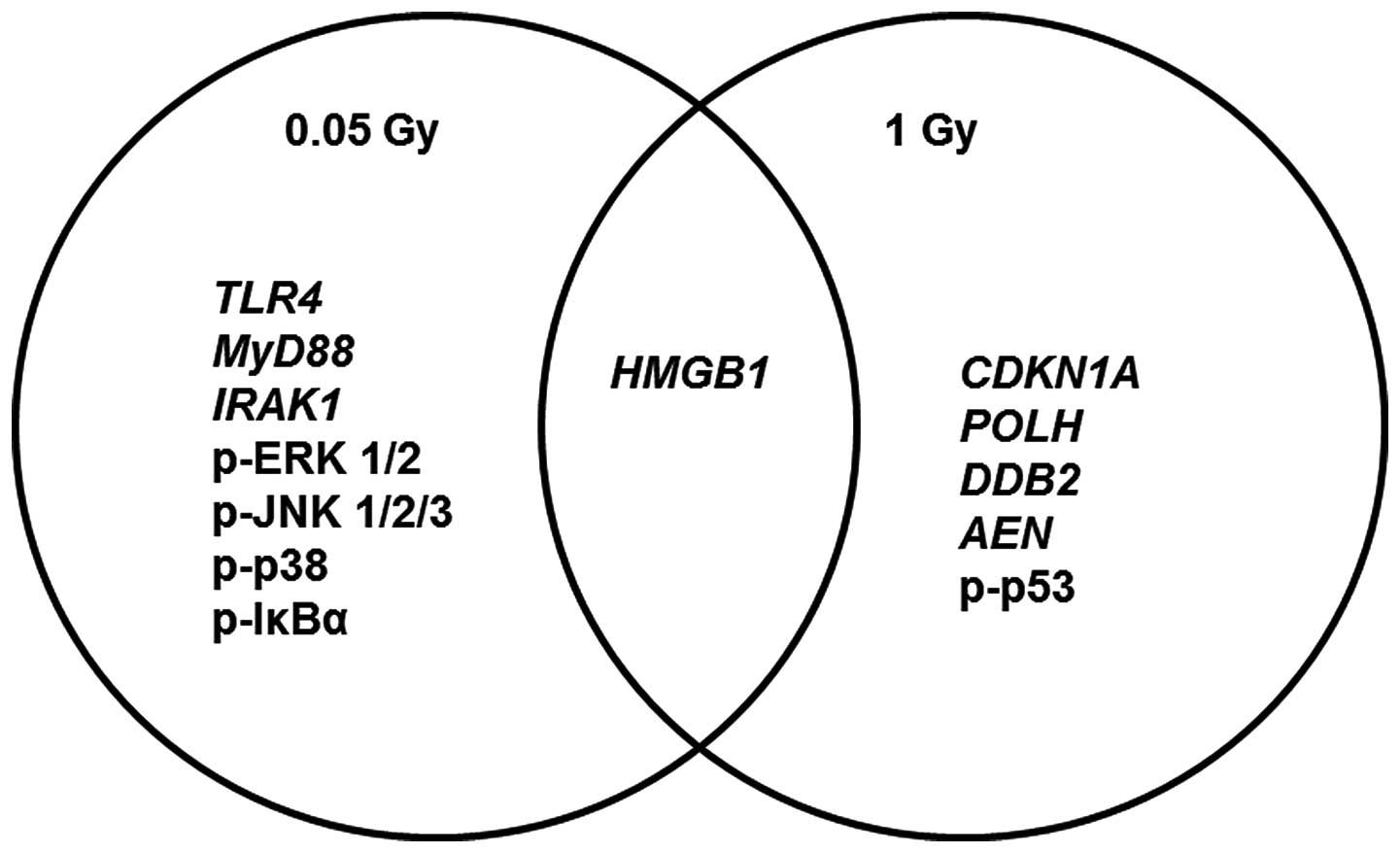|
1
|
Hall EJ and Brenner DJ: Cancer risks from
diagnostic radiology. Br J Radiol. 81:362–378. 2008. View Article : Google Scholar : PubMed/NCBI
|
|
2
|
Pearce MS, Salotti JA, Little MP, et al:
Radiation exposure from CT scans in childhood and subsequent risk
of leukaemia and brain tumours: a retrospective cohort study.
Lancet. 380:499–505. 2012. View Article : Google Scholar : PubMed/NCBI
|
|
3
|
Pernot E, Hall J, Baatout S, et al:
Ionizing radiation biomarkers for potential use in epidemiological
studies. Mutat Res. 751:258–286. 2012. View Article : Google Scholar : PubMed/NCBI
|
|
4
|
Shah DJ, Sachs RK and Wilson DJ:
Radiation-induced cancer: a modern view. Br J Radiol.
85:e1166–e1173. 2012. View Article : Google Scholar : PubMed/NCBI
|
|
5
|
El-Saghire H, Thierens H, Monsieurs P,
Michaux A, Vandevoorde C and Baatout S: Gene set enrichment
analysis highlights different gene expression profiles in whole
blood samples X-irradiated with low and high doses. Int J Radiat
Biol. 89:628–638. 2013. View Article : Google Scholar : PubMed/NCBI
|
|
6
|
Hume DA: The mononuclear phagocyte system.
Curr Opin Immunol. 18:49–53. 2006. View Article : Google Scholar : PubMed/NCBI
|
|
7
|
Bauer M, Goldstein M, Christmann M, Becker
H, Heylmann D and Kaina B: Human monocytes are severely impaired in
base and DNA double-strand break repair that renders them
vulnerable to oxidative stress. Proc Natl Acad Sci USA.
108:21105–21110. 2011. View Article : Google Scholar : PubMed/NCBI
|
|
8
|
Kawai T and Akira S: The role of
pattern-recognition receptors in innate immunity: update on
Toll-like receptors. Nat Immunol. 11:373–384. 2010. View Article : Google Scholar : PubMed/NCBI
|
|
9
|
Krutzik SR, Tan B, Li H, et al: TLR
activation triggers the rapid differentiation of monocytes into
macrophages and dendritic cells. Nat Med. 11:653–660. 2005.
View Article : Google Scholar : PubMed/NCBI
|
|
10
|
Piccinini AM and Midwood KS: DAMPening
inflammation by modulating TLR signalling. Mediators Inflamm.
2010:6723952010. View Article : Google Scholar : PubMed/NCBI
|
|
11
|
Kawai T and Akira S: Toll-like receptors
and their crosstalk with other innate receptors in infection and
immunity. Immunity. 34:637–650. 2011. View Article : Google Scholar : PubMed/NCBI
|
|
12
|
Shan YX, Jin SZ, Liu XD, Liu Y and Liu SZ:
Ionizing radiation stimulates secretion of pro-inflammatory
cytokines: dose-response relationship, mechanisms and implications.
Radiat Environ Biophys. 46:21–29. 2007. View Article : Google Scholar : PubMed/NCBI
|
|
13
|
Ivanov S, Dragoi AM, Wang X, et al: A
novel role for HMGB1 in TLR9-mediated inflammatory responses to
CpG-DNA. Blood. 110:1970–1981. 2007. View Article : Google Scholar : PubMed/NCBI
|
|
14
|
Menendez D, Shatz M, Azzam K, Garantziotis
S, Fessler MB and Resnick MA: The Toll-like receptor gene family is
integrated into human DNA damage and p53 networks. PLoS Genet.
7:e10013602011. View Article : Google Scholar : PubMed/NCBI
|
|
15
|
Cargnello M and Roux PP: Activation and
function of the MAPKs and their substrates, the MAPK-activated
protein kinases. Microbiol Mol Biol Rev. 75:50–83. 2011. View Article : Google Scholar : PubMed/NCBI
|
|
16
|
Hayden MS and Ghosh S: NF-κB, the first
quarter-century: remarkable progress and outstanding questions.
Genes Dev. 26:203–234. 2012.
|
|
17
|
Pfaffl MW: A new mathematical model for
relative quantification in real-time RT-PCR. Nucleic Acids Res.
29:e452001. View Article : Google Scholar : PubMed/NCBI
|
|
18
|
UNSCEAR. Report of the fifty seventh
session: Summary of low-dose radiation effects on health. 2010.
|
|
19
|
Liu C, Zhang C, Mitchel RE, et al: A
critical role of toll-like receptor 4 (TLR4) and its’ in vivo
ligands in basal radio-resistance. Cell Death Dis. 4:e6492013.
|
|
20
|
Liu C, Gao F, Li B, et al: TLR4 knockout
protects mice from radiation-induced thymic lymphoma by
downregulation of IL6 and miR-21. Leukemia. 25:1516–1519. 2011.
View Article : Google Scholar : PubMed/NCBI
|
|
21
|
Lucas K and Maes M: Role of the Toll like
receptor (TLR) radical cycle in chronic inflammation: possible
treatments targeting the TLR4 pathway. Mol Neurobiol. 48:190–204.
2013. View Article : Google Scholar : PubMed/NCBI
|
|
22
|
Schaue D and McBride WH: Links between
innate immunity and normal tissue radiobiology. Radiat Res.
173:406–417. 2010. View
Article : Google Scholar : PubMed/NCBI
|
|
23
|
Wang FP, Li L, Li J, Wang JY, Wang LY and
Jiang W: High mobility group box-1 promotes the proliferation and
migration of hepatic stellate cells via TLR4-dependent signal
pathways of PI3K/Akt and JNK. PLoS One. 8:e643732013. View Article : Google Scholar : PubMed/NCBI
|
|
24
|
Andersson U and Tracey KJ: HMGB1 is a
therapeutic target for sterile inflammation and infection. Annu Rev
Immunol. 29:139–162. 2011. View Article : Google Scholar : PubMed/NCBI
|
|
25
|
Weng H, Deng Y, Xie Y, Liu H and Gong F:
Expression and significance of HMGB1, TLR4 and NF-κB p65 in human
epidermal tumors. BMC Cancer. 13:3112013.
|
|
26
|
Mittal D, Saccheri F, Venereau E, Pusterla
T, Bianchi ME and Rescigno M: TLR4-mediated skin carcinogenesis is
dependent on immune and radioresistant cells. EMBO J. 29:2242–2252.
2010. View Article : Google Scholar : PubMed/NCBI
|
|
27
|
Ermakov AV, Konkova MS, Kostyuk SV,
Egolina NA, Efremova LV and Veiko NN: Oxidative stress as a
significant factor for development of an adaptive response in
irradiated and nonirradiated human lymphocytes after inducing the
bystander effect by low-dose X-radiation. Mutat Res. 669:155–161.
2009. View Article : Google Scholar
|
|
28
|
Kostyuk SV, Ermakov AV, Alekseeva AY, et
al: Role of extracellular DNA oxidative modification in radiation
induced bystander effects in human endotheliocytes. Mutat Res.
729:52–60. 2012. View Article : Google Scholar : PubMed/NCBI
|
|
29
|
Ichikawa S, Miyake M, Fujii R and Konishi
Y: MyD88 associated ROS generation is crucial for Lactobacillus
induced IL-12 production in macrophage. PLoS One. 7:e358802012.
View Article : Google Scholar : PubMed/NCBI
|
|
30
|
Fiedler K, Kokai E, Bresch S and Brunner
C: MyD88 is involved in myeloid as well as lymphoid hematopoiesis
independent of the presence of a pathogen. Am J Blood Res.
3:124–140. 2013.PubMed/NCBI
|
|
31
|
Windheim M, Stafford M, Peggie M and Cohen
P: Interleukin-1 (IL-1) induces the Lys63-linked polyubiquitination
of IL-1 receptor-associated kinase 1 to facilitate NEMO binding and
the activation of IkappaBalpha kinase. Mol Cell Biol. 28:1783–1791.
2008. View Article : Google Scholar : PubMed/NCBI
|
|
32
|
Xiao Z, Visentin GP, Dayananda KM and
Neelamegham S: Immune complexes formed following the binding of
anti-platelet factor 4 (CXCL4) antibodies to CXCL4 stimulate human
neutrophil activation and cell adhesion. Blood. 112:1091–1100.
2008. View Article : Google Scholar : PubMed/NCBI
|
|
33
|
Kasper B, Brandt E, Brandau S and Petersen
F: Platelet factor 4 (CXC chemokine ligand 4) differentially
regulates respiratory burst, survival, and cytokine expression of
human monocytes by using distinct signaling pathways. J Immunol.
179:2584–2591. 2007. View Article : Google Scholar
|
|
34
|
Narang H and Krishna M: Mitogen-activated
protein kinases: specificity of response to dose of ionizing
radiation in liver. J Radiat Res. 45:213–220. 2004. View Article : Google Scholar : PubMed/NCBI
|
|
35
|
Rizvi A, Pecaut MJ, Slater JM, Subramaniam
S and Gridley DS: Low-dose γ-rays modify CD4(+) T cell signalling
response to simulated solar particle event protons in a mouse
model. Int J Radiat Biol. 87:24–35. 2011.
|
|
36
|
Kim CS, Kim JM, Nam SY, et al: Low-dose of
ionizing radiation enhances cell proliferation via transient ERK1/2
and p38 activation in normal human lung fibroblasts. J Radiat Res.
48:407–415. 2007. View Article : Google Scholar : PubMed/NCBI
|
|
37
|
Liang X, So YH, Cui J, et al: The low-dose
ionizing radiation stimulates cell proliferation via activation of
the MAPK/ERK pathway in rat cultured mesenchymal stem cells. J
Radiat Res. 52:380–386. 2011. View Article : Google Scholar : PubMed/NCBI
|
|
38
|
Tsukimoto M, Homma T, Mutou Y and Kojima
S: 0.5 Gy gamma radiation suppresses production of TNF-alpha
through up-regulation of MKP-1 in mouse macrophage RAW264.7 cells.
Radiat Res. 171:219–224. 2009. View Article : Google Scholar : PubMed/NCBI
|
|
39
|
Lödermann B, Wunderlich R, Frey S, et al:
Low dose ionising radiation leads to a NF-κB dependent decreased
secretion of active IL-1β by activated macrophages with a
discontinuous dose-dependency. Int J Radiat Biol. 88:727–734.
2012.
|
|
40
|
Turtoi A, Brown I, Oskamp D and
Schneeweiss FH: Early gene expression in human lymphocytes after
gamma-irradiation-a genetic pattern with potential for
biodosimetry. Int J Radiat Biol. 84:375–387. 2008. View Article : Google Scholar : PubMed/NCBI
|
|
41
|
Brengues M, Paap B, Bittner M, et al:
Biodosimetry on small blood volume using gene expression assay.
Health Physics. 98:179–185. 2010.PubMed/NCBI
|
|
42
|
Kabacik S, Mackay A, Tamber N, et al: Gene
expression following ionising radiation: identification of
biomarkers for dose estimation and prediction of individual
response. Int J Radiat Biol. 87:115–129. 2011. View Article : Google Scholar : PubMed/NCBI
|
|
43
|
Mayer C, Popanda O, Greve B, et al: A
radiation-induced gene expression signature as a tool to predict
acute radiotherapy-induced adverse side effects. Cancer Lett.
302:20–28. 2011. View Article : Google Scholar : PubMed/NCBI
|
|
44
|
Riecke A, Rufa CG, Cordes M, Hartmann J,
Meineke V and Abend M: Gene expression comparisons performed for
biodosimetry purposes on in vitro peripheral blood cellular subsets
and irradiated individuals. Radiat Res. 178:234–243. 2012.
View Article : Google Scholar
|
|
45
|
Rashi-Elkeles S, Elkon R, Shavit S, et al:
Transcriptional modulation induced by ionizing radiation: p53
remains a central player. Mol Oncol. 5:336–348. 2011. View Article : Google Scholar : PubMed/NCBI
|
|
46
|
Wagner EF and Nebreda AR: Signal
integration by JNK and p38 MAPK pathways in cancer development. Nat
Rev Cancer. 9:537–549. 2009. View Article : Google Scholar : PubMed/NCBI
|






















